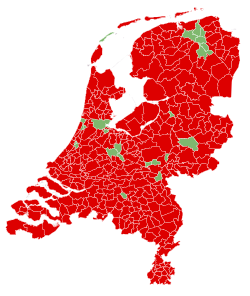
Major blow against “endless austerity” Liberal/Labour government
The ‘No’ vote in the Dutch referendum regarding an association treaty between the EU and the Ukraine was a serious blow against the “endless austerity” government of the Liberal and the Labour Party and a vote against neo-liberalism, in general. It was also a blow against the EU elite. The required minimum vote in the referendum was 30%; the turnout was 32%. The No vote received a clear majority of 60%.
The Ukraine-European Union treaty, on closer political and economic ties, was already signed by the Dutch government and approved by all other EU nations and Ukraine, and provisionally took effect in January. The Dutch referendum on the approval of the agreement was held on 6 April 2016. The referendum question was: "Are you for or against the Approval Act of the Association Agreement between the European Union and Ukraine?"
All the establishment Dutch parties were in favour of the Treaty. The initiative for the referendum was taken by right wing bloggers, who electronically collected the necessary signatures for the referendum to be held. Their purpose was to obstruct the EU. The anti-EU, anti-Islam politician, Geert Wilders, was a leading figure in the No campaign. The broad left opposition Socialist Party laterly joined the movement against the treaty.
There is a strong anti-EU mood in the Netherlands; the referendum on the European Constitution was lost in 2005. In 11 years since this mood has only grown. Although though this mood is strong enough to win referenda fairly easily, it is not capable of growing into a broader movement of opposition. The anti-EU mood is largely exploited by nationalist and conservative forces but ‘national retrenchment’ and the resurrection of national borders offers no solution. In the absence of any real opposition it is only logical that the referendum result contains a strong nationalist and conservative content.
The result was also no doubt influenced by the publication of the ‘Panama Papers’, which cited Ukraine president Petro Poroshenko as a tax dodging billionaire. Corruption in the Ukraine was a major reason for people to vote no. Ironically the Netherlands is one of the major tax havens of Europe and a key country that squirrels fortunes into tax paradises further away.
The ‘Yes’ vote was strong in university cities like Amsterdam, Leiden, Utrecht and Groningen. The pro-capitalist EU propaganda has a certain basis among the higher educated.
Referenda are becoming more popular as they are one of the few means available to censure the policies of the government. Despite current nationalist sentiments, research indicates that if there were to a referendum about the introduction of market policies in health care or about the retention of the pension age of 65 (now going up to more than 70 years by 2030), such referenda could successful kick out such policies. Referenda are likely to be held on TTIP (already in preparation) or possibly on ‘open borders’ or the Euro.
Referendum results expose weaknesses of capitalist governments
The Dutch ruling class got away with ignoring the referendum on the EU constitution in 2005 – the just ignored the result and concluded the Treaty of Lisbon. They will try to get out of their present predicament by some adjustments to the treaty, possibly dividing it up into a trade treaty and a treaty on political cooperation, to be concluded later. But the Dutch elite are worried by the growing opposition to neo-liberalism and austerity, especially in areas where the crisis has hit workers hard, like in Groningen (in the north), Brabant and Limburg (in the south).
They realise that a majority are opposed to these policies, although often only in a passive way. And the general elections will be held in March 2017. The Liberals and Labour party, which form the present coalition, are expected to suffer heavy losses and the formation of a new coalition government will be difficult.
With the referenda on the Brexit and on migration in Hungary lying ahead, the risks for the European capitalist rulers are increasing. The lesson is that if even relatively small groups of right-wing bloggers can frustrate government policy, a mass working class opposition would be a much more serious threat. The referendum results expose the weaknesses of capitalist governments and a stream of damaging data from publications like the Panama Papers will also continue to undermine their credibility. As their weakness becomes more visible and as their policies only bring more of the same, the chances for a more serious challenges, this time from the working class, can only increase.
The Dutch working class also need a political alternative. Over the last decade, the SP has risen in the polls only to sharply fall again after it disappointed workers by not putting forward a clear socialist alternative. A mass party of the Left is needed urgently, to campaign against austerity and to aim to win power on the basis of majority support and with a socialist programme. This should include a call for a socialist Europe instead of the bosses' EU – for a socialist confederation of European states, on a free and equal basis, where the needs of the majority would be met, not the greedy 1%.


Be the first to comment